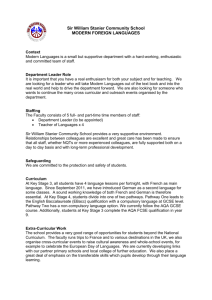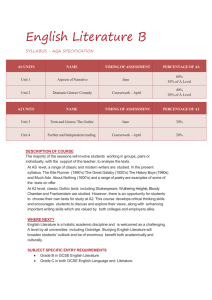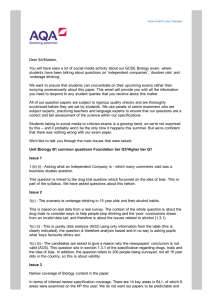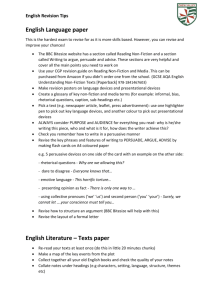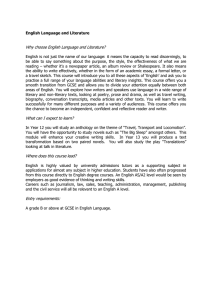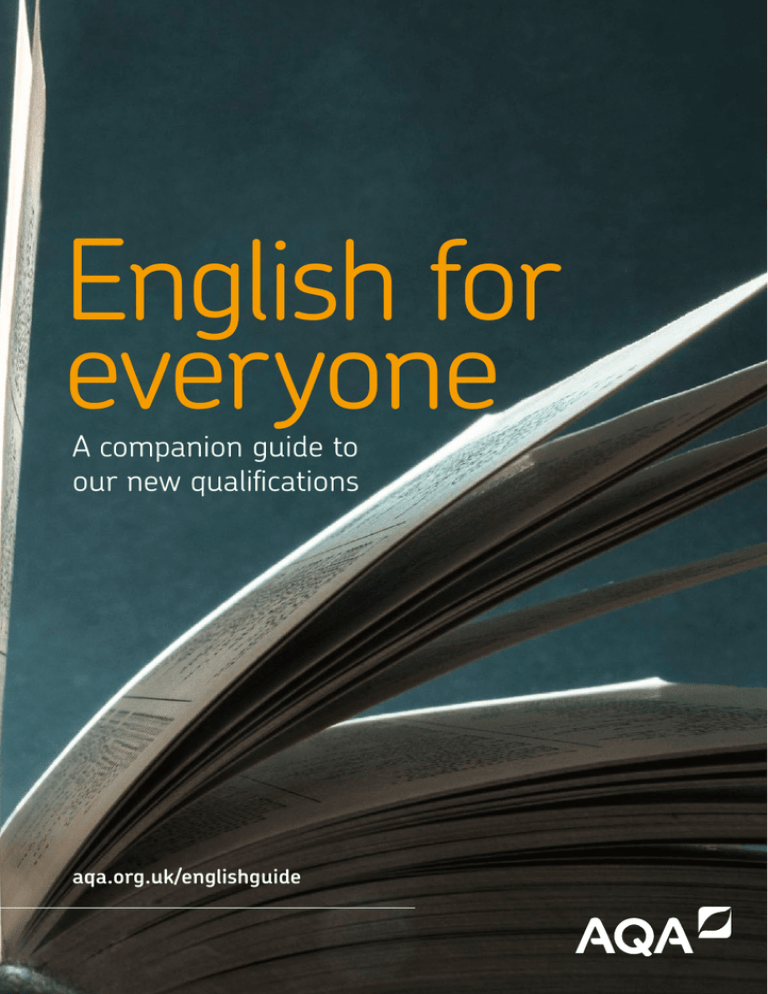
English for
everyone
A companion guide to
our new qualifications
aqa.org.uk/englishguide
Hello
Welcome to this overview of AQA’s new specifications for GCSE English
Language and English Literature. It contains everything you need to
know about the Government’s changes, details of our new specifications,
how to prepare for the new exams and the support and resources
available to help you.
To find out more about our approach, please visit
aqa.org.uk/englishguide
From September 2015, GCSE English qualifications
are changing:
• there
will be two qualifications: GCSE English Language and
English Literature
• assessment will be through examination of a minimum of 3½
hours for English Language and 4 hours for English Literature
• students will be graded from 9 to 1 rather than A* to G, with 9
as the highest grade.
In English Language:
• s tudents must respond to 19th, 20th and 21st century texts
in every exam series
• students must compare at least two unseen texts
• spoken language (currently called speaking and listening)
will still be assessed but will not count towards exam results
• 20% assessment weighting will be for spelling, sentence structure,
punctuation and grammar.
In English Literature:
• students
must study a 19th century novel, a whole Shakespeare play,
and a selection of poetry, including representative Romantic poetry
• students must compare at least two of the unseen texts
• the modern prose or drama must be by writers from the British Isles
• exams will be closed book.
Progress 8
• Progress
throughout secondary education will be monitored using
the new Progress 8 measure being introduced in 2016, where
English Language could be double-weighted if taken in combination
with English Literature. Find out more about Progress 8 on our
website at aqa.org.uk/new-performance-tables
3
OUR VISION
FOR ENGLISH
“
We share your love of English and your commitment
to teaching and learning. We believe that English
should be an enabling subject for students of
all abilities, no matter what their culture, motivation
or ability. We believe that by working with you,
we can help you inspire your students to achieve
their true potential. We want all teachers to develop
engaging and creative classroom practice and
naturally, as education moves on, we’ll be here to help.
Gary Pollard
Head of English at AQA
Find out about our vision for GCSE English at
aqa.org.uk/English-films
4
”
Our approach
Over the years, as market leaders in our field, we’ve talked to many
teachers like you to understand the issues you face and to ensure that
our qualifications are right for you and your students. More recently,
we’ve spoken to hundreds of teachers across the country, English
subject associations such as the National Association for the Teaching
of English (NATE) and the National Association of Advisers in English
(NAAE), as well as organisations such as the Globe Theatre, Digital
Theatre Plus and Poetry by Heart to ensure that these new
qualifications are based on what is best practice for the subject,
teachers and students.
We’ve taken two double decker buses out on the road, meeting 900
teachers from 300 schools across the breadth of the country. We’ll be
back on tour in June and July, so look out for our bus near your school.
From our findings, we have designed new qualifications that will engage
and stretch all students, providing the opportunity for them to achieve
their best. With AQA you also benefit from unrivalled support including
access to the largest network of English teachers in the country.
5
GCSE ENGLISH
LANGUAGE
Literacy for life
We’ve designed our specification to assess
students’ skills in English at all levels, providing
questions that are accessible to all while stretching
and challenging the highest of achievers.
Here, we highlight some of the things that we think
will support you and all your students.
Creating an assessment journey
We’re designing our exam papers to take your
students on an assessment journey. This is
designed to build confidence in your students at
the start of the assessment with more familiar and
accessible questions, before leading gradually
to more challenging and extended response
questions at the end. We have done this to help
guide students through each paper, making the
experience a more comfortable and engaging one.
We’ve also looked at the structure of our papers to
better support a wide range of student abilities.
Two paper structure
Students will be assessed over a 3½ hour period,
split equally across two papers, giving them time
to express their true abilities and achieve their best
possible grade.
6
SPECIFICATION AT A GLANCE
Distinctive identities
for each paper
By creating identities for each
paper you will have a consistent
approach as to what will be
assessed and how we will
assess it. This will allow students
to prepare with confidence for the
assessment ahead.
• Paper
one will assess a
literature fiction text to
develop reading skills.
• Paper two will assess a
non-fiction and literary
non-fiction text in order to
focus on writers’ attitudes
and viewpoints.
Making a range of
texts accessible
The types of texts we have to
include in our specifications need
to be high quality. So we have
thought carefully about how to
support all abilities.
• All
students will benefit from the
introduction of reading time at
the start of each examination.
• Paper one will focus on a
single text, to act as a lead-in
to the examination.
8
• Paper two builds on this
with two linked texts on the
same topic.
• The focus in each paper will be
on what the texts are about and
how they are written and won’t
require any prior knowledge or
understanding outside of this.
Reading texts as a
support for writing
With reading and writing
assessment having an equal
weighting of 50%, each student
will need content and ideas to
write about. So we’ve designed
both papers to ensure the reading
sources act as a bridge to each
specific writing task.
• Paper one’s creative text leads
to a creative writing task.
• Paper two’s texts lead to the
students writing about their
own views on that topic.
• This helps to create two
balanced papers of
equal demand.
Spoken language study
Paper 1: Explorations in
creative reading and writing
Paper 2: Writers’ viewpoints
and perspectives
Section A: Reading
• One literature fiction text.
Section B: Writing
• Descriptive or narrative writing.
Section A: Reading
• One non-fiction text and one
literary non-fiction text.
Section B: Writing
• Writing to present a viewpoint.
Assessed
• 1 hour 45 mins written exam.
• 80 marks.
• 50% of GCSE.
Section A (40 marks) (25%)
• One single text.
• Questions:
- One short form response
- Two longer responses
- One extended response.
Section B (40 marks) (25%)
• One extended writing question.
Assessed
• 1 hour 45 mins written exam.
• 80 marks.
• 50% of GCSE.
Section A (40 marks) (25%)
• Two linked texts.
• Questions:
- One short form response
- Two longer responses
- One extended response.
Section B (40 marks) (25%)
• One extended writing question
Controlled assessment: Spoken language
(AO7–AO9)
• Presenting.
• Responding to questions
and feedback.
• Use of Standard English.
Assessed
• Teacher set throughout course.
• Marked by teachers.
• Separate endorsement
(0% weighting of GCSE).
The new spoken language study
will be a separate endorsement
to the qualification. All the exam
boards will apply similar levels of
moderation for this endorsement.
9
GCSE ENGLISH
LITERATURE
Literature for all
Being a literate reader widens horizons and opens
up a lifetime of opportunities. Reading enables
students to acquire knowledge and to build on
what they already know. Our vision is that access
to Literature should be an entitlement for students
of all ages, abilities and interests.
Texts for every interest
We are very aware that text choices
are vital in enabling your students to engage
with and enjoy the English Literature course.
As a result, we have consulted widely with
teachers from a broad range of schools to find
out which texts they would like to teach, within
the regulations provided by the Department
for Education (DfE) and Ofqual for these new
qualifications. We’ve retained text choices from
our existing specification, including those that
have been popular for controlled assessment,
and have introduced new texts that we think
will appeal to different types of students.
10
SPECIFICATION AT A GLANCE
Our texts include
An Inspector Calls
Lord of the Flies
Play script of The Curious
Incident of the Dog in the
Night-Time
Anita and Me
Frankenstein
Macbeth
Romeo and Juliet
Great Expectations
Pigeon English
Dr Jekyll and Mr Hyde
Accessible to students
at all levels
When designing our assessment,
we’ve looked at a number of ways
to ensure it is accessible to
students of all levels.
• W
e have spread the assessment
over two papers, grouping
similarly structured questions
together, to allow students to
maintain their focus.
12
• We
will be pre-releasing material
to allow students to prepare for
paper one, focusing on extracts
while also widening their
response to the novel or play
as a whole.
• A choice of questions and
clusters on paper two, that
allow students of all abilities
to access the exam paper.
Supporting transition from
Key Stage 3 and progression
to A-level
Some schools have told us that
they are planning to place a greater
emphasis on 19th century texts at
Key Stage 3. To support this, we’re
developing a scheme of work on a
19th century novel that will help to
develop your students’ confidence
and competence in reading 19th
century prose.
In our assessment, we’ve designed
the questions across the two
papers to challenge all abilities.
This includes opportunities to write
detailed and perceptive repsonses.
The wide range of texts available
will allow you to choose options
that engage and challenge all
your students.
Paper 1: Shakespeare and the
19th century novel
Section A
• Shakespeare plays.
Section B
• The 19th century novel.
Assessed
• 1 hour 45 minute written exam.
• 64 marks.
• 40% of GCSE.
• Closed book exam.
Section A
• Students will answer one
question on their play of choice.
They will be required to write in
detail about an extract from the
play and then to write about the
play as a whole.
Section B
• Students will answer one
question on their novel of choice.
They will be required to write in
detail about an extract from the
novel and then to write about the
novel as a whole.
Additional information
For both the Shakespeare play and
the 19th century novel, students will
receive guidance about a set act
and a set chapter or chapters at the
beginning of the Spring term before
the exam. The extracts on the exam
for both the Shakespeare play and
the 19th century questions will be
taken from the set act or chapter(s).
Paper 2: Modern prose/
drama, poetry selection and
unseen poetry
Section A
• Modern prose or drama texts.
Section B
• The poetry anthology.
Section C
• Unseen poetry.
Assessed
• 2 hour 15 minute written exam.
• 96 marks.
• 60% of GCSE.
Section A: Modern texts
• Students will answer one essay
question from a choice of two
on their studied modern prose
or drama text.
Section B: Poetry
• Students will answer one
comparative question on
one named poem and one
other poem from their chosen
anthology cluster.
Section C: Unseen poetry
• Students will answer one
question on each of two
unseen poems and one
comparative question.
13
ASSESSMENT
YOU CAN TRUST
After all of their hard work, you need to be confident that your students’
work is marked fairly, consistently and reliably. That’s our priority too.
Getting the marking right
Understanding assessment
The quality of marking is at
the heart of our assessment
procedures and we do everything
to ensure we are able to publish
the right results first time.
In order to achieve this we
recruit high calibre examiners,
train and standardise them to a
high standard and monitor their
marking through rigorous quality
control processes.
• To show exactly how we
award grades and give you a
better understanding of how
assessment works, we’ve
produced a short animated film.
Go to: aqa.org.uk/explainingassessment
We also explain how a
specification is created and how
a question paper is created.
• Clear,
consistent and wellstructured question papers
ensure students understand
precisely what is being asked.
• Exemplar
materials with student
answers and commentary from
our most senior examiners help
you understand how the mark
scheme is applied.
14
• You can analyse your students’
results with Enhanced Results
Analysis (ERA), our free
online tool. Register at
aqa.org.uk/era
• For information about results
and our post-results services,
visit aqa.org.uk/results
MONITORING
PROGRESSION
We want to help you maintain effective, consistent and accurate internal
assessments from Key Stage 3 onwards.
Topic tests
Assessments and progress
We’ve put together an advisory
group of English teachers who,
along with our team, identified
key topics for progression. In the
form of paper tests, our topic tests
will be available to teachers to
download from the secure area of
our website. Designed to act as
stepping stones in preparation for
GCSEs, these are based on the
current structure of GCSE papers.
We aim to provide summative
progress tests in year 7, 8 and 9,
that will replicate the assessment
strategies and structures in our
newly designed GCSE English
Language papers. In fact, we
would use the same type of
questions, weighting and suitable
marks for each year group.
How they will work
There are five key aspects of
skills development and, relating
directly to Key Stage 4 assessment
objectives, our topics will focus on
these: understanding; interpreting;
analysing; comparing and
evaluating. A bank of components
for each year group will be tagged
to each assessment objective
and schools could select these
as appropriate. You could tailor
these topic tests to suit your
year groups.
To find out more, or if you’d like
to ask any questions, please
call our subject team on
0161 953 7504 or email
english-gcse@aqa.org.uk
17
SUPPORT AND
RESOURCES
We know that support and resources are vital for your teaching, so we’ve
worked with experienced teachers to develop a range of resources for
you. Here are just some of them.
Planning
Teaching
• Summary of changes to see
what’s new, what’s changed
and what stays the same.
• AQA’s online digital specification
is an innovative approach to
integrating our specification and
resources, providing free, high
quality, relevant resources when
you need them.
• Outline teaching plans to help
you prepare your course.
• Teacher case studies to show
how other teachers like you are
planning to teach the course.
• Free launch meetings starting
in July 2014.
• Preparing to teach meetings
in 2015.
Our meetings will be a mix of face
to face and online events to fit in
with your schedule.
18
• Our popular digital anthology
is being updated to include
GCSE English Language and
A-level resources.
• Extra resources to support
areas which are new or have
changed:
elping with reading 19th
h
century texts
- supporting students in
Key Stage 3 with 19th
century texts
- the interpretation of context
in literature
- spoken language.
-
Preparing for assessment
Reviewing results
• Specimen question papers and
mark schemes.
• Our free online tool, Enhanced
Results Analysis, offers instant
exam results analysis by school,
subject, classes, groups and
individual students.
• Additional sample questions.
• Student answers and examiner
commentaries to help you
understand what examiners
are looking for.
Largest support network
You’ve told us that access to subject experts is essential to you. That’s
why you can contact our subject team directly and have access to our
network of local subject advisers to share best practice.
While we are providing everything you need to deliver our
specification, we recognise that there will be times when you want
a little bit more. We also have a range of paid for resources to help
with your teaching.
• Teachit – online resources developed by teachers for teachers
• Textbooks – Collins, Cambridge and OUP will be producing AQA
textbooks and digital resources, which will be ready in 2015
• CPD – whether you’re looking to develop your subject
expertise or leadership skills we have a range of professional
development support.
Book your launch event now at aqa.org.uk/englishlaunchevents
Find out about our great resource and support offer at aqa.org.uk/
english-resources
19
YOUR
QUESTIONS
ANSWERED
Q
Students of all abilities do very well on the unseen poem at the
moment. Adding in the requirement to compare unseen texts
inevitably increases the level of challenge.
How can I help my students cope with answering questions on
a 19th century novel or Shakespeare for an exam?
We have worked hard to select set texts and design questions
for both the Shakespeare plays and the 19th century novels
that will enable all students to reach their potential. We have
consulted with teachers at every stage to get your opinions
about which novels and plays would be best for your students.
A
In addition, because we understand that this is the area of most concern,
we are developing free resources to support you when you teach the
19th century novel. These resources will break down the novel and make
it manageable for you and your students.
20
A
With this in mind we have designed a question strategy that guides
students through the texts and supports them in their understanding.
Here are some of the most common questions you have asked about the
new English Language and Literature specifications, along with what we
have done, and will do, to support you and your students.
Q
Will comparing two unseen texts be too difficult for
GCSE students?
Students will have to compare texts on the English Language exam
as well, so the skills of comparison will be transferable across the two
qualifications. We expect that teachers will want to integrate the teaching
and study of Language and Literature in order to make it clear to
students that the skills in each are transferable across the two exams.
Q
Will we have to buy lots of new books?
We will continue to provide the free anthology for the poetry
section and a free anthology of short stories as an option.
When selecting the other set texts we have, where possible,
included texts that schools are likely to have in their stock
cupboards, either because they are on current specifications
or they have been popular for other reasons in recent years.
A
We will also provide a number of free support resources for AQA
schools and colleges, including a new version of our digital anthology
with an extended range of resources.
21
Q
I’m worried that the new exams will be too hard for some of my
students and an untiered exam won’t stretch my very able students?
Throughout our development of the new specification we have
made a commitment to make it accessible to all.
The loss of tiering obviously means that we have to design an
assessment that both stretches at the top end and is accessible at
the bottom end. In doing this, as well as consulting with teachers,
we have spoken to subject experts and assessment experts to
ensure the questions and mark schemes are designed to provide
effective assessment.
A
For example, in GCSE English Language, we take the student on an
assessment journey by building confidence in the student at the start
of the assessment with more familiar and accessible questions, before
leading gradually to more challenging and extended response questions
at the end. We have done this to help guide candidates through each
paper - making the experience a more comfortable and engaging one.
Q
Without controlled assessment how will I structure
a two-year course?
You’ve told us that the removal of any internal assessment
(apart from in spoken language), although liberating,
is also a bit daunting.
A
We expect that many schools will choose to plan a two year
course that integrates the teaching of GCSE English Language with
GCSE English Literature. Certainly, the introduction of, for example,
19th century texts to both specifications might suggest that this
would be a fruitful approach.
We will support your planning through our resources and in addition,
our network of subject advisers will provide local support and
facilitate connections between schools so that good practice can
be shared locally.
For English Literature, we have selected a range of set texts that
means that teachers in all contexts will be able to select texts that are
accessible to and of interest to their particular students. To support the
transition from Key Stage 3 we are developing a teaching resource that
will support students’ study of 19th century prose before they start the
GCSE course.
We will provide a range of exemplar student responses to show how they
engage a range of abilities.
Find out more about how we’ve designed assessment that is
suitable for all students at aqa.org.uk/english-films
22
23
MEET THE
ENGLISH
TEAM
Our team is working to make
sure our English qualifications
are right for you. Here are just
some of the people who’ve
contributed to developing our
new specifications.
English support team
We’ve got a dedicated team
of GCSE English customer
support advisers. Our team is
there to answer your calls so
you’ll always get through to
a subject expert.
Examining team
Our examining team are all
current classroom practitioners,
ex-teachers and other
educational experts. They
are the people writing the
papers and also the ones
who’ve put together the
practice specimen materials.
So you can be assured of
clarity and consistency. Our
exam development team is
vastly experienced. The team
is confident it has matched
Ofqual’s subject criteria with the
best, clearest, most accessible
specification possible.
THE GCSE TEAM
Gary Pollard
Gary Pollard,
Head of English
David Baker,
Qualifications Manager
Jean Hudson,
Qualifications Manager
Before joining AQA, Gary spent
15 years teaching in a large
11-18 secondary school in the
Rotherham area where he held
posts of Subject Leader,
Assistant Head of upper school
and Assistant Head of sixth form.
This gave him significant
knowledge and experience of
raising attainment in English
and securing whole school
improvement.
David has over 20 years’
experience in assessment, having
worked at AQA since 1994. He
has worked in a range of roles
across AQA, having been involved
in developing Social Sciences
and various specifications in the
past through to his current role
as Qualifications Manager for
English Literature.
Jean is responsible for our
GCSE English suite, leading the
development, management and
ongoing improvement of this
range of qualifications.
A further three years as a Local
Authority Adviser and four years
as a National Strategy Regional
Adviser provided him with
extensive experience of supporting
improvements in teaching and
learning in English.
Gary is responsible for the
development and delivery of all
of our English qualifications from
Entry level through to our GCSEs
and A-levels. He has been involved
throughout the development of
our new specifications, working
closely with teachers and
assessment experts.
Since moving to the English team
in 2012, David’s focus has been
on improving the communications
between AQA, the English
community and key stakeholders,
in particular through the recent
changes from Ofqual and the
Department for Education (DfE),
and in the lead up to the launch of
our new GCSEs.
She’s been at AQA for three and
a half years, and before that has
a wide range of experience in
education. She has many years’
teaching experience, having been
a teacher of English, a Head of
English and the Head of Lower
School at schools in the north
west area. Jean has also spent
over 10 years working in local
authority school improvement as
the lead for secondary English
and is a member of the Institute
of Educational Assessors.
25
Andrew Holstead,
Qualifications Developer
for English Language
Ruth Johnson,
Qualifications Developer
for English Literature
Andrew been part of the English
team focusing on our qualifications
for the last 13 years, and has
worked at AQA for over 21 years in
a range of roles from assessment
operations through to supporting
students accessing our exams.
Ruth was educated at a
comprehensive school in Greater
Manchester then read English at
St Catharine’s College, Cambridge.
As a qualifications developer,
Andrew has been closely involved
in the process of developing
our new specification for
English Language.
26
After several years working in
magazine journalism, Ruth taught
in secondary schools for 14
years, teaching GCSE English
and English Literature and A-level
English Language and English
Literature. She also worked as
an A-level English Language
examiner. Ruth joined AQA as a
Subject Manager in GCSE English
in 2010. She is currently working
towards a Doctorate in Education;
the subject of her thesis is
assessment in English and
social equity.
“
We have constructed
qualifications which allow
students at all levels of
ability to engage with
the subjects in a way
that is appropriate for
them. The text choices
are vibrant and inspiring,
and we feel that the
assessment strategies
are fair and will reward
achievement.
”
WE’RE
HERE
TO HELP
If you have any questions or
need more information, please
contact a member of our team.
Call on 0161 953 7504 or email
english-gcse@aqa.org.uk
Jean Hudson
Qualifications Manager
The information in this guide is based on the draft
specifications submitted to Ofqual in May 2014, and
is subject to change. We will publish the accredited
specification and specimen question papers as soon
as we receive Ofqual accreditation. This is expected
in autumn. You will always find the most up to date
information on our website at www.aqa.org.uk/english
Copyright © 2014 AQA and its licensors. All rights reserved.
AQA Education (AQA) is a registered charity (number 1073334) and a company limited by guarantee registered
in England and Wales (number 3644723). Registered address: AQA, Devas Street, Manchester M15 6EX.

